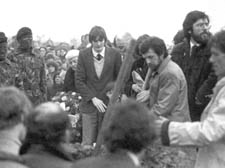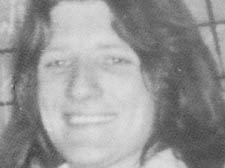
Gerry Adams (far right) oversees the funeral of Bobby Sands as he is laid to rest in Belfast in 1981

Bobby Sands |
Bobby Sands' song of struggle must play on
Prison wardens sang in celebration at the death of a hunger striker, but others around the world heard a different tune, writes Peter Beresford Ellis
Bobby Sands has become one of the iconic figures of the struggle for the reunification of
Ireland. He died at the age of 27 on the 66th day of a hunger strike attempting to restore the Special Category Status that all Irish political prisoners had enjoyed until it was removed in 1976. Its removal was a cynical attempt by government to convince the world that they were merely ordinary criminals.
When Bobby Sands died on May 5, 1981, he had been elected as a Member of the Westminster Parliament.
He was the first of 10 prisoners allowed to die between May and August. Among them was another elected representative of his people, Kieran Doherty who had been elected to the Dáil, the Parliament of Ireland. When a member of the Westminster Parliament dies, it is the custom to announce the fact in the House of Commons with a terse statement.
A triumphalist Thatcher could not refrain from breaking protocol. “Sands was a convicted criminal…He chose to take his own life,” she told the House. The Honorable Members on all sides dutifully murmured their support.
At least they did not go so far as prison warders who, on the morning of his death, serenaded the Irish political prisoners with a rendering of Oh, What a Beautiful Morning. The prisoners did not rise to the bait.
Reaction throughout the world was very different. Parliaments in many countries were silent for a minute in his honour.
Protests and tributes spread. Nelson Mandela, then in jail, joined a hunger strike. Fidel Castro compared him to Che Guevara. The Iranians renamed the street in which the British Embassy stood ‘Bobby Sands Street’ and in a stupid piece of pettiness, the embassy then had its postal address moved to a side gate in another street so that the embassy letterhead would not have to bear his name.
Sands has now become an enduring figure of resistance whose life has inspired millions around the world.
It is sad that few people in Britain even today know what Bobby Sands and his comrades were actually protesting about.
There were five simple demands.
1) The right of prisoners to wear their own clothes.
2) The right not to do prison work other than the maintenance and cleaning of the portions of the prison occupied by them and that they be allowed study time.
3) The right of association with fellow political prisoners at recreation time.
4) The right to have a weekly visit, letter or parcel and right to organise their own educational pursuits.
5) The right of the remission of sentences as was normally provided for all other prisoners. These were the rights taken away in March, 1976, by the then Labour government.
Was it merely his role in the hunger strike that led to this young man from Belfast to be cast in the role of a world hero?
Denis O’Hearn, now a Professor of Sociology in New York, was a journalist in Belfast in the 1970s, writing for the Guardian. He has written a powerful biography that attempts to uncover the truth of this enigmatic and controversial hero.
Sands was not merely a natural leader but a young man with literary talent who might well, under other circumstances, have achieved a different literary reputation. He wrote in both the Irish language and in English. He produced some impressive poetry such as The Crime of Castlereagh and perhaps one of the most powerful prison accounts ever – One Day in My Life. Written on toilet paper with a biro refill and smuggled out of his prison, this book, outside England, has taken its rightful place beside the great European classics on imprisonment.
The late Nobel Laureate Seán MacBride, founder member of Amnesty International wrote of the book: “I wish it were possible to ensure that those in charge of formulating British policy in Ireland would read these pages. They might begin to understand the deep injuries which British policy has inflicted upon this nation, and now seek to heal these wounds.”
Above all, it is a human document of suffering, determination, of courage and faith. Sands wrote with an economy of words, a dry humour, charting an attempt to preserve his human identity against cold, dirt, boredom and the sadism of the prison warders.
O’Hearn’s biography is one of those essential books in understanding Ireland’s ongoing “English Problem”.
|


